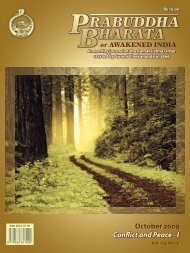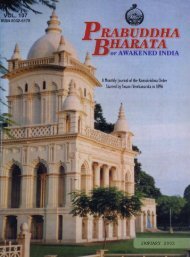P
PB Cover July 2011.indd - Advaita Ashrama
PB Cover July 2011.indd - Advaita Ashrama
- No tags were found...
Create successful ePaper yourself
Turn your PDF publications into a flip-book with our unique Google optimized e-Paper software.
Significance of the Term Putra in Vedic Literature<br />
51<br />
the seer of the first ten hymns of the Rig Veda,<br />
is clearly described as vaiśvāmitrasya putra, the<br />
child of Vishvamitra.22 Madhuchanda becomes<br />
Madhuchandas in the Aitareya Brahmana and<br />
is treated by later scholars as a son. Skandaswami,<br />
the pre-Sayana commentator, clearly<br />
described the sage as viśvāmitrasya putra. But<br />
chanda, metre, is a neuter word, and to conceive<br />
of it as a female one has to modify the last syllable<br />
to get the feminine form: chandā—though<br />
Madhu chanda is not conceived of as a female<br />
seer in Saunaka’s list (fifth century bce).23 That<br />
the same expression can be equally used for a<br />
male and female seer is evident in the name Suradhas<br />
(1.100.17), which is another name found in<br />
the Rig Veda and is also the seer of the hymn.<br />
The seers of that hymn are said to be Varsa girah,<br />
children of Vrisagirah. Skandaswami figures out<br />
that Rijrasva, Ambarisa, Saha deva, Bhayamana,<br />
and Suradha are Vrisagirah’s putraḥ,24 and all are<br />
considered sons of Vrisa girah by later commentators<br />
of the Rig Veda. But Suradha is of course<br />
a female seer and can never be a masculine name.<br />
Probably Suradha was the sister and the youngest<br />
of all the other brothers, but all are clubbed<br />
together as Varsagirah. We can note again that<br />
no gender discrimination was made with regard<br />
to the word putra. Indra is said to have procreated<br />
Surya, sun, Usha, dawn, Prithivi, earth, and<br />
Agni, fire (3.31.15) —these are the names of gods<br />
and goddesses put together in the same fashion<br />
as the putraḥ of Vrisagirah. As Sinivali, the<br />
sister of the devas, is offered oblations, so sisters—like<br />
the wives of Rig Vedic society—definitely<br />
performed Vedic rituals. The example of<br />
Suradha proves the point. We have another example<br />
in the seer Gotamo Nodha 25—Nodha<br />
was the child of Gotama, and his gender is still<br />
being questioned.<br />
How a father and a mother help their children<br />
is exemplified by the Ribhus, gods of the<br />
PB July 2011<br />
rains, who help all living organisms by creating<br />
grass in upper lands and water in lower surfaces.26<br />
In the preceding mantra putrebhyāḥ denotes<br />
all living organisms, children of the manes.<br />
The Ashwins, the twin gods, are said to be subhaga<br />
putrāḥ, auspicious offspring (1.181.4). Agni<br />
becomes the putra of one who serves and nourishes<br />
it (2.1.9). As the putrāḥ obey the father, the<br />
sacrificer abides by the dictum of Agni (1.68.5).<br />
The rays of the sun, though basically imagined<br />
to be feminine because they bear water, are also<br />
said to be masculine since they are responsible<br />
for rains, which increase fertility. But Indra becomes<br />
the pati, master, of raśmi, rays, who are<br />
the offspring of Agni (1.69.4). In the ‘Narayana<br />
Suktam’ 27 Agni’s raśmaya, rays, are stated to be<br />
santata, continuously spreading, and this gives<br />
Agni its condition of being omnipresent and<br />
omnipotent, with its light spreading to all parts<br />
of the body. For the luminescent Indra, Agni<br />
issues many mighty children, mahasputrā, in the<br />
form of rays, which are treated as feminine in<br />
the hymn of the Rig Veda.28 The all-knowing<br />
father’s father is eulogised as Aditya, sun, who<br />
receives this epithet because of being the father<br />
of its rays, which in turn are the parents of the<br />
earth (1.164.16). And we know that Aditi is the<br />
supreme goddess behind Aditya. The sun is the<br />
source of all life. In the mother’s womb develop<br />
many a prajā, children, who are nirṛthimā viveśa,<br />
covered with ignorance, (1.164.32). Here putra<br />
and prajā become synonymous.<br />
The inheritance laws for the son and daughter<br />
were almost similar in those days. He who serves<br />
Brahmanaspati, father and mother of the gods, is<br />
awarded with wealth for himself, his relatives, his<br />
own people, race, and children (2.26.3). So, if the<br />
duhitā, daughter, of a father without sons gives<br />
birth to both a son and a daughter, the grandson<br />
performs sacrifices and the granddaughter<br />
is honoured with wealth (3.31.1–2). The duhitā<br />
511
















